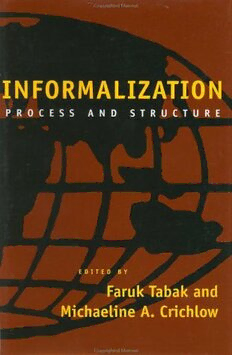
Informalization: Process and Structure PDF
118 Pages·2000·19.505 MB·English
Most books are stored in the elastic cloud where traffic is expensive. For this reason, we have a limit on daily download.
Preview Informalization: Process and Structure
Description:
Since the 1970s, the rapid and unexpected growth of the informal economy in the core zones of the world economy - the United States in particular - has been the focus of much scholarly investigation. To examine the social and spatial pervasiveness of this world-historical process usually associated with the Third World, Faruk Tabak and Michaeline A. Crichlow bring together a group of contributors to broaden the historical and geographical context for the study of informalization. Demonstrating the cyclical patterns of expansion and contraction through which the informal economy has developed, the authors trace the history of the informal economy within and against that of capitalism, from the 14th century to the 20th. They look at the present global situation of the informal economy, inside and outside the order established by American hegemony. They examine the factors - at both the state and grassroots level - to determine its likely trajectory in the near future. They also revisit the relationship between capitalism and informalization, questioning the usefulness of the concept of informality itself.
See more
The list of books you might like
Most books are stored in the elastic cloud where traffic is expensive. For this reason, we have a limit on daily download.
